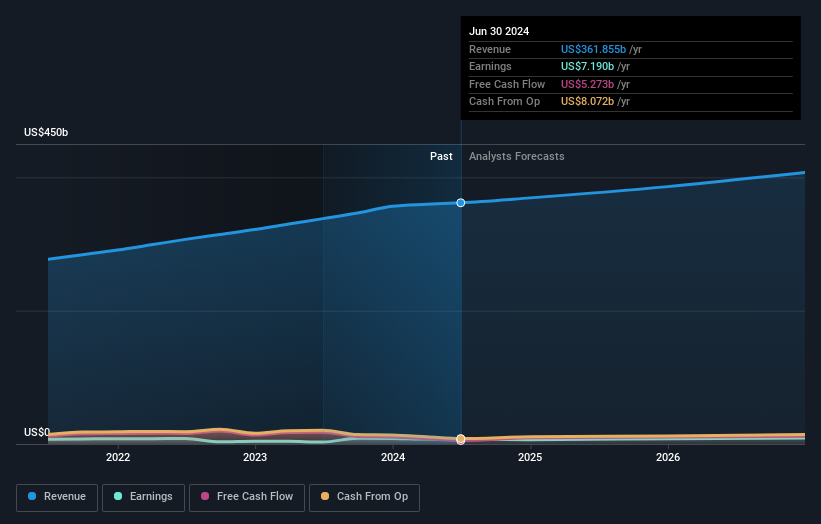As an investor, it’s worth trying to ensure your overall portfolio outperforms the market. But the risk with stock picking is that you’re likely buying underperforming companies. Unfortunately, over the long term, CVS Health Corporation ( NYSE:CVS ) shareholders have been through that, with the share price falling 31% over three years, compared to a market return of around 17%.
Now let’s take a look at whether the company’s long term performance is in line with the progress of its underlying business.
Check out our latest analysis for CVS Health
To quote Buffett, “Ships will sail around the world, but the Flat Earth Society will thrive. There will continue to be a wide disconnect between price and value in the marketplace…” One way to examine how market sentiment has changed over time is to look at the interaction between a company’s share price and its earnings per share (EPS).
Although the share price has been declining over three years, CVS Health has actually managed to grow EPS at 1.3% per year in that time. This is very puzzling and suggests there may be something temporarily propping up the share price, or perhaps past growth expectations were unreasonable.
Considering the numbers, we can surmise that the market had higher expectations for EPS growth three years ago. However, looking at other metrics might tell us something new.
Given the health of the dividend, it’s not likely the market is concerned. It’s good to see that CVS Health has grown its earnings over the past three years. But it’s unclear why the stock price is falling. It might be worth digging deeper into the fundamentals to make sure you don’t miss out on any opportunities.
You can see how earnings and revenue have changed over time in the image below (click on the chart to see the exact values).

It’s good to see that insiders have been buying shares in the last twelve months. Still, future earnings are far more important than whether current shareholders make money. See what analysts are forecasting for CVS Health here. Interaction Future profit forecast graph.
What about dividends?
When looking at investment returns, it’s important to consider the following differences: Total shareholder return (TSR) and Price Earnings RatioWhile the share price return only reflects the change in the share price, the TSR includes the value of dividends (assuming they were reinvested) and the benefit of any discounted capital raising or spin-off. It’s fair to say the TSR gives a more complete picture for stocks that pay a dividend. In the case of CVS Health, the TSR for the last 3 years is -24%, which exceeds the share price return mentioned above. And it’s not difficult to surmise that dividend payments largely explain this divergence.
A different perspective
It’s been a tough year for CVS Health investors, with a total loss of 8.3% (including dividends) while the market gained about 23%. But remember that even the best stocks can underperform the market over a twelve month period. Longer term investors won’t be as spooked, as the stock has returned 1.0% annually over five years. If the fundamental data continues to point to long term, sustainable growth, the current sell-off could be an opportunity worth considering. While it’s well worth considering the different impacts that market conditions can have on the share price, there are other factors that are even more important. Still, CVS Health is One warning sign in investment analysis things you should know…
CVS Health isn’t the only stock insiders are buying. Lesser known companies this free This free list of growing companies with recent insider purchasing, could be just what you’re looking for.
Please note, the market returns quoted in this article reflect the market weighted average returns of stocks that currently trade on US exchanges.
Have feedback about this article? Concerns about the content? Stay in touch Please contact us directly. Or email editorial-team (at) simplywallst.com.
This article by Simply Wall St is general in nature. We use only unbiased methodologies to provide commentary based on historical data and analyst forecasts, and our articles are not intended as financial advice. It is not a recommendation to buy or sell stocks, and does not take into account your objectives, or your financial situation. We seek to provide long-term focused analysis driven by fundamental data. Note that our analysis may not take into account the latest price sensitive company announcements or qualitative material. Simply Wall St has no position in any of the stocks mentioned.
#CVS #Health #NYSECVS #shareholders #lost #investing #stock #years